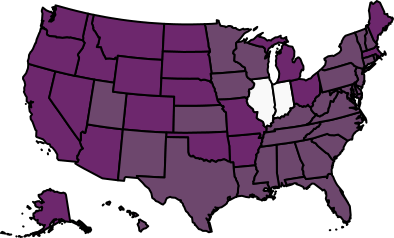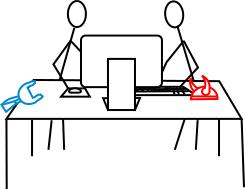What if, for local politics at least, there were a better way?

In fact, what if a better way already exists through our current laws and technology, and we just haven’t tried it yet?
First, some background.
Forty-eight of America’s fifty states allow ballot initiatives at the city or county level. A ballot initiative is a law created and ratified by citizens rather than legislators. Someone drafts a proposed law, gets a bunch of other voters to sign a petition saying that it should be law, and then the people vote on it.
In addition to these states allowing ballot initiatives at city and county levels, a little under half of them also allow people to create ballot initiatives at the state level. In other words, in a little over twenty states, ordinary citizens can write and create state laws.

Notice that these initiatives still pretty much require fighting.
The draft law is written by a citizen, lobbyist, or corporate consultant, and then all the other citizens only have two choices: support it by signing the petition and voting for it, or oppose it by not signing or voting against it. Just like everything else in our modern democracy, you pick a side, and you fight for it.
Here’s how you fix that: put the draft law online on a site that allows the public to make annotations, comments, and suggested edits.
I’m proposing creating an official government web page for each petition that allows everyone to be a part of writing the law, before it even goes out for signatures. It can be done using free, open-source software that already exists (here’s another option if you don’t like the first example, and there are more where these came from).

Think about what this means: to make changes in policy, you no longer have to pick a fixed position and fight for it. You can talk about what matters to you with people who have different opinions, hear what matters to them, and collaborate on a way to meet everyone’s needs.
And that’s how we can create new policies, not by fighting, but by working together.
Frequently Asked Questions
Wait, you’re saying we’ll make things less combative and toxic by putting more of it on the Internet? Have you been on the Internet?
Oh, I have. It’s not pretty. Today’s Internet can bring out the absolute worst in everybody – it removes context, recognition that you’re talking to real people, and the social and physical cues that go with normal communication, and combines that environment with the ability to respond instantly when your emotions are at their absolute highest and the thought you’ve put into your response is minimal. Godwin’s Law exists for a reason.
Here’s the thing: those discussions you’re thinking of, in comment sections and on social media, have next to zero direct effect on actual public policy. And currently, the only way for people to change that is to be even louder, angrier, and more attention-grabbing.
When you give people a space where they know that their words will have a direct impact on policy, their words change drastically. When Brazil embarked on a similar project of crowdsourcing a major law, they were ready to have to moderate the discussion. Heavily. But it turns out that even with thousands of participants, they only had to edit or delete comments a handful of times. Here’s a translation from one of the most vitriolic disagreements on their site:
Dear Denise, thank you for your thoughtful response and for speaking on behalf of citizen rights, about which you express yourself very properly. I will try to answer you and Marcel at the same time. I thank the two of you for the privilege of doing so.*
When people contribute to official government sites in a way that they know they will be taken seriously without having to raise their voice, the quality of discussion improves drastically. The same person swearing IN ALL CAPS in a comment section, when invited to contribute to actual government policy, suddenly becomes polite and thoughtful. A few people have taken to calling it the “Marble Columns Effect.”
Even on sites not maintained by the government, disagreements can often be civil when the underlying site is structured to handle them. Debating site Kialo is a pretty good example.
*In the original Portuguese: “Prezada Denise, obrigado por sua atenciosa resposta e por ser cidadã ciosa de seus direitos, sobre os quais você se expressa com muita propriedade. Procurarei responder a você e ao Marcel ao mesmo tempo. Agradeço aos dois o privilégio de poder fazê-lo.”
Which states currently allow ballot initiatives at the state level? Where can I learn more about their processes?
Here’s a list of the states that allow ballot initiatives, along with links to the relevant state government websites that describe their process.
First, states that send successful initiatives straight to the ballot (in most cases):
- Alaska
- Arizona
- Arkansas
- California
- Colorado
- Idaho
- Missouri
- Montana
- Nebraska
- North Dakota
- Oklahoma
- Oregon
- South Dakota
- Utah
- Washington
- Wyoming
Then, states that send initiatives to the state legislature first, and then to the ballot if the legislature votes no or ignores it:
You can find more information about these states here.
If forty-eight out of fifty states allow ballot initiatives at the local level, which are the two that don’t?
Indiana and Illinois. Illinois technically allows it in changing the classification of a city for tax purposes, but not for anything else.
Other states do have restrictions on what can and can’t be legislated through ballot initiatives. You can read more about which states allow what here.
Doesn’t [insert state here] already has some sort of public hearing or comment process before these initiatives go out for signatures?
A few do. And that’s a good thing. But most of them happen in court hearings that are a lot harder to get to than a web page.
Missouri and California do have some online representation in theory, but finding the particular pages is hard, and public discussion, comments, and edits aren’t enabled.
Who are you and why are you suggesting this?
I’m a private citizen. I am not (as of this writing) funded by anyone, and I am researching and advocating for this in my spare time.
I don’t stand to benefit from this being adopted. I’m doing this because I believe in it.





